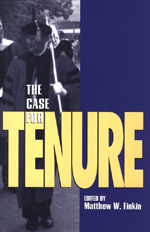 (Reprinted with permission from the Industrial and Labor Relations review, written by Ronald G. Ehrenberg.)
(Reprinted with permission from the Industrial and Labor Relations review, written by Ronald G. Ehrenberg.)
The Age Discrimination in Employment Act, as amended in 1987, which eliminated mandatory retirement for American college and university professors effective January 1, 1994, has led to concerns about the continued viability of the faculty tenure system. It came at a time of diminished federal and state government support for higher education, along with corporate downsizing, increased layoffs, and a general decline in job security for American workers. Is it any wonder, then, that the public and state legislatures in a number of states have called for a reexamination of the tenure system and the development of formal post-tenure review processes?
Matthew W. Finkin, a noted legal and industrial relations scholar at the University of Illinois, draws on materials from the American Association of University Professors, academic articles, legal cases, speeches, and his own personal writings to provide a staunch defense of the tenure system. He patiently explains what tenure for faculty means, what it does and does not protect, and why it continues to be essential for modern academic institutions.
The Case for Tenure is a wonderful book and its publication comes at a very opportune time. While as an economist I naturally resonate with the economic arguments in support of a tenure system, its more basic goal of protecting academic freedom and allowing scholarship on controversial subjects of inquiry to flourish should not be minimized. This point was brought home to me personally during the late 1970s, when three trustees at the institution I now help lead tried to block my promotion to full professor. The president of my great university ruled them out of order, but the event left me with a profound appreciation of the importance of tenure.
Finkin makes far too many insightful points to summarize, but two are worthy of mention here. First, tenure does not guarantee lifetime employment. It merely shifts the “property right” to a position from the academic institution to the tenured faculty member. The faculty member may be dismissed for “just cause,” but only after a process that assures that the faculty member received due process and that judgments about performance involve faculty participation. Properly designed systems of post-tenure review are fully consistent with the tenure system. Similarly, tenured faculty members can be dismissed if economic conditions (“financial exigency”) warrant the closure of their school, program, or department, but only as a last resort and after all other responsible means of dealing with the problem have been exhausted.
Second, although academic institutions as we know them go back hundreds of years, tenure as we know it only became widespread with the joint adoption of the 1940 Statement of Principles on Academic Freedom and Tenure by the AAUP and the American Association of Colleges. Justification of continuance of the tenure system must be based on a comparison of its benefits and costs in a contemporary world rather than a long history.
The Case for Tenure is a very important book because it does this. It should be widely read by faculty members, university administrators, trustees, and state and federal officials involved with higher education.
I would be remiss if I did not note that The Case for Tenure is an unapologetic case in defense of tenure and in support of the AAUP. For this reason, Finkin does not discuss as thoroughly as I would have liked the growing use of part-time and adjunct faculty, lecturers, and other non-tenure-track faculty by academic institutions to reduce costs and increase their flexibility, and the implications of these trends for the tenure system. He also provides examples of reports written by AAUP committees in evidentiary hearings that may lead to the censure of institutions, but never provides evidence evaluating whether the threat of censure for violations of AAUP guidelines influences academic institutions’ behavior today.
Finally, missing is a discussion of whether, when an institution makes a commitment of tenure to a faculty member, the faculty member in turn should make a commitment to work during his tenure for the well-being of his or her department, college, and institution as well as for his or her own professional advancement.
Appetizer
Tenure Defense
I believe that academic tenure is good for America: that it is essential for the protection of academic freedom, that it is necessary to attract the intellectually gifted to the academic life and to create conditions that allow first-rate scholarship to flourish. This is not to deny its drawbacks, both for the individual and for the institution, but it is to maintain that the system is far better for society than any substitute suggested thus far.
—from The Case for Tenure